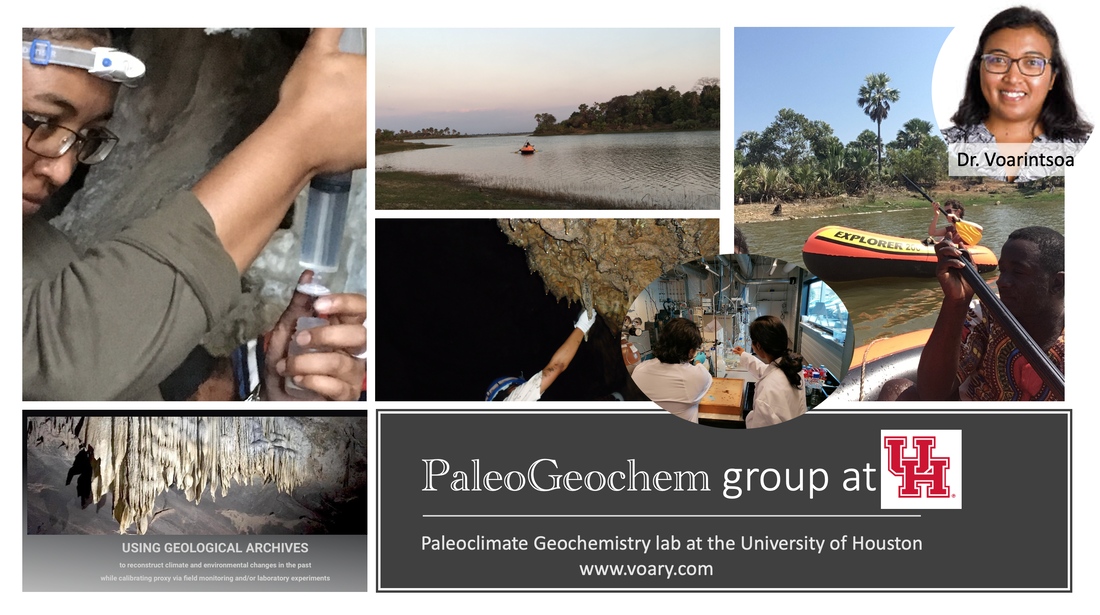Ny R. Voarintsoa
USING GEOLOGICAL ARCHIVES
to reconstruct climate and environmental changes in the past
while calibrating proxy via field monitoring and/or laboratory experiments
to reconstruct climate and environmental changes in the past
while calibrating proxy via field monitoring and/or laboratory experiments
Welcome to the PaleoGeochem Research Group Page
Research Motivation
Climate and environmental changes are among important challenges facing our society today, but they still remains a subject of debates. We see them collectively as a "cancer" that can progressively destroy our planet Earth if preventative measures are not taken. This motivates us to focus more on paleo- reconstructions. Why? Because our knowledge of what has happened in the past will help us better prepare for the future.
The causes of climate and environmental changes are diverse but they can be generally grouped into three main categories: (1) natural, (2) anthropogenic, and (3) the combination of 1 and 2.
Paleoclimate and paleoenvironmental studies are among fundamental scientific disciplines that can help us understand the causes and the nature of the changes before the instrumental records. As a geologist and paleoclimate scientists, our job can be understood as follow "a doctor investigating the health states of a patient, checking the patient's level of pain, and prescribing medicines or specific treatments to minimize the pain". Analogically, we investigate a range of proxies from geological archives, such as stalagmites (=upward growing mounds of sediments in caves), including stable isotopes, petrography, and mineralogy to reconstruct the changes and to understand the magnitude of the changes. Along with other available paleo- records, we use the datasets to test climate models. We also investigate lake sediments as another type of geological archive to cross-check paleoclimate reconstruction. Along with the proxy development, we perform monitoring studies at caves and lakes environments to calibrate paleoclimate and paleoenvironment interpretation. We also develop various laboratory experiments to simulate natural conditions, the knowledge from which we use to carefully interpret natural environments and natural conditions.
The PaleoGeochem research group wishes to communicate the results of our scientific investigations to continue bringing awareness to a broader–lay audience. Th PI has written few blogs, participated in film documentary, and has founded a non-profit association, e.g. the Geological Society of Madagascar, to help us reach that goal. Public awareness is a primary antidote to the negative impacts of climate and environmental changes, and convincing policy-makers to take preventative actions would minimize the risks associated with them.
The PaleoGeochem lab group will provide a relationship and work environment that helps everyone learn, thrive, and accomplish each lab member's objective.
The causes of climate and environmental changes are diverse but they can be generally grouped into three main categories: (1) natural, (2) anthropogenic, and (3) the combination of 1 and 2.
Paleoclimate and paleoenvironmental studies are among fundamental scientific disciplines that can help us understand the causes and the nature of the changes before the instrumental records. As a geologist and paleoclimate scientists, our job can be understood as follow "a doctor investigating the health states of a patient, checking the patient's level of pain, and prescribing medicines or specific treatments to minimize the pain". Analogically, we investigate a range of proxies from geological archives, such as stalagmites (=upward growing mounds of sediments in caves), including stable isotopes, petrography, and mineralogy to reconstruct the changes and to understand the magnitude of the changes. Along with other available paleo- records, we use the datasets to test climate models. We also investigate lake sediments as another type of geological archive to cross-check paleoclimate reconstruction. Along with the proxy development, we perform monitoring studies at caves and lakes environments to calibrate paleoclimate and paleoenvironment interpretation. We also develop various laboratory experiments to simulate natural conditions, the knowledge from which we use to carefully interpret natural environments and natural conditions.
The PaleoGeochem research group wishes to communicate the results of our scientific investigations to continue bringing awareness to a broader–lay audience. Th PI has written few blogs, participated in film documentary, and has founded a non-profit association, e.g. the Geological Society of Madagascar, to help us reach that goal. Public awareness is a primary antidote to the negative impacts of climate and environmental changes, and convincing policy-makers to take preventative actions would minimize the risks associated with them.
The PaleoGeochem lab group will provide a relationship and work environment that helps everyone learn, thrive, and accomplish each lab member's objective.
"Develop a passion to learn, if you do you will never cease to grow"
Copyright © 2015-2022 Ny Riavo Voarintsoa



